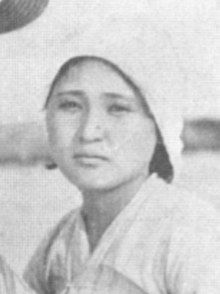Moon Ye-bong
Moon Ye-bong | |
|---|---|
문예봉/文藝峰 | |
 Moon Ye-bong in 1932. | |
| Born | January 3, 1917 |
| Died | March 26, 1999 (aged 82) |
| Occupation | Actress |
Moon Ye-bong (Korean: 문예봉, Hanja: 文藝峰; January 3, 1917–March 26, 1999) was a North Korean actress.
Biography[edit]
Her career began on the stage as an early teen, and by the early 1930s, she appeared in her first film: A Ferry Boat That Has No Owner (1932).[1]:352 Moon Ye-Bong was widely seen as representative of the "New Woman," or of modern Korean women.[2] By the 1930s and 1940s, she was one of the most popular actresses in Korea.[3]
She starred in many pro-Japanese films during the Japanese occupation of Korea.[1] In 1941, she starred in the Korean-made, Korean-language film Angels without a Home, which was about Korean street children; despite the fact that the Japanese occupiers had outlawed as a language of instruction except in primary schools, was supported by the Japanese Ministry of Education and shown widely in Japan.[4]
She migrated to North Korea in 1948.[1]:349 Moon Ye-Bong was in the second film ever made in North Korea, The Blast Furnace.[5] She starred in the 1954 film A Partisan Maiden as a communist guerilla fighting the Americans during the Korean War.[1]:350
While she received awards from the North Korean government during the 1950s, she fell victim to the political purges of 1969; in 1980, she was rehabilitated and named a "people's actress."[1]:352
Selected filmography[edit]
- A Ferry Boat That Has No Owner (Imja eomneun narutbae, 1932)
- Wanderer (Nageune, 1937)
- Military Train (Gunyong yeolcha, 1938)
- Tuition (Sueomnyo, 1940)
- Volunteer (Jiwonbyeong, 1941)
- Angels without a Home (1941)
- Straits of Chosun (Joseon haehyeop, 1943)
- My Home Village (Nae gohyang, 1949)
- The Blast Furnace (Yonggwangno, 1950)
- A Boy Partisan (Sonyeon ppalchisan, 1951)
- A Partisan Maiden [A Partisan Woman] (Ppalchisan cheonyeo, 1954)
- A Newly-Wed (Sinhon bubu, 1955)
References[edit]
- ^ a b c d e Lee, Yun-Jong (2020). "Mun Ye-bong, a Partisan Maiden in a "Partisan State"". Korea Journal. 60 (3): 349–370. doi:10.25024/KJ.2020.60.3.349.
- ^ Song, Xiaoqian (2018). "Screening Life and Dreams" – via Ewha Women's University Library.
{{cite journal}}: Cite journal requires|journal=(help) - ^ Jackson, Jr., Earl (10 November 2009). "The Medium as the Message: Cinematic Intertexuality in Im Kwon-taek's The General's Son". Silhouette. VII: 57–58 – via Google Books.
- ^ High, Peter B. (2003). The Imperial Screen: Japanese Film Culture in the Fifteen Years' War, 1931-1945. University of Wisconsin Press. p. 307. ISBN 978-0-299-18134-5.
- ^ Lim Jang-won (2020-07-24). "Korea Film Museum reopens offline, featuring 12 North Korean movies". Korea Herald. Retrieved 2023-01-17.
